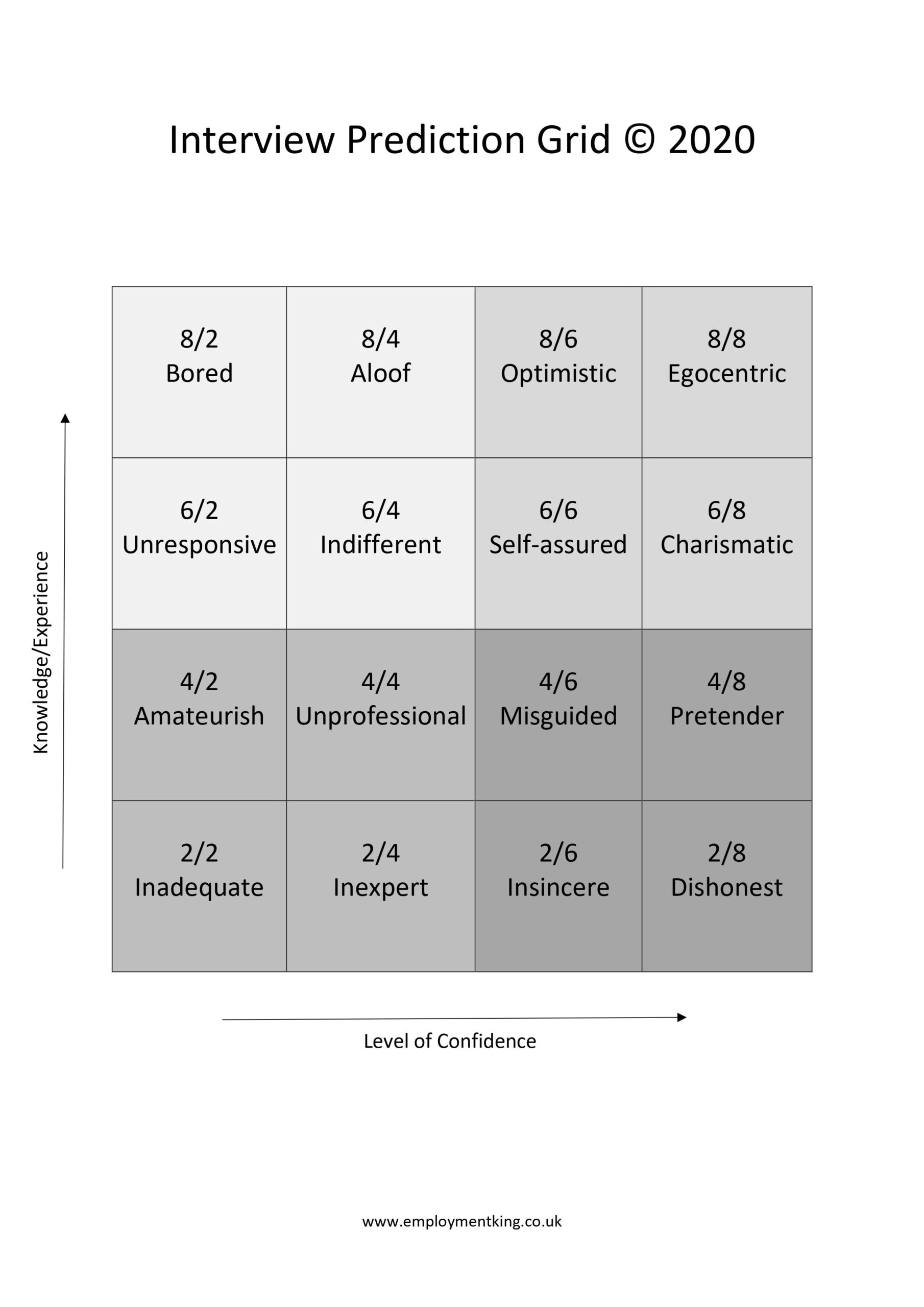Congratulations on completing the Interview Prediction Grid Test (IPG) ©2020.
Below is a breakdown of your Interview Identity
8/4 – Aloof
A distant and stand-offish interviewee created through a high knowledge/experience and sufficient confidence level, is a concern to employers looking to recruit a highly skilled employee to join a team of experts.
The 8/4 – Aloof applicant, the highest scorer in the high/low segment, is often looking to move from a medium level position to high level role (or a high-salaried role). For highly paid vacancies, the interviewer is most likely an industry expert possessing high levels of confidence in his/her own ability.
Much research shows that interviewees will receive more job offers when the interviewer finds commonality with the applicant. If the candidate, being interviewed by a confident interviewer, lacks confidence, rapport will be broken.
Employers often search for a new team member that will fit-in with the team dynamics and the company culture. Anyone who sits outside of this image, the aloof applicant, can be viewed as potentially harmful. If an unapproachable, unresponsive and unhelpful applicant is allowed to join a current group of motivated employees, the influence could be highly disruptive.
Such 8/4 – Aloof applicants, because they possess a sufficient level of confidence, can give enough detail in an interview answer, allowing the employer to be aware of their high level of knowledge/experience. Detailed answers, delivered confidently, increase likeability and change the perception of how the candidate is viewed as a team member.
If the majority of answers lack specifics due to a nervous delivery style, and most do, a sense of distance between the applicant and interviewer will be created.
The employer initially will put the lack of detailed answers down to interview anxiety. When applying for highly paid medium positions, organisations are expecting applicants to have the communication skills, and confidence, to be able to express themselves clearly.
Strengths
A vast amount of knowledge and experience, often being an expert within an industry sub-niche, along with a unique set of industry related skills and experiences increase the likelihood of gaining employment.
When confident about a particular topic, relevant to their expertise, answers are clear, well-structured and descriptive enough for an employer to see the value in having such candidates as part of their team.
In addition, their long duration in the job sector enables them to identify the job criteria offering the employer relevant answers and an insight into their impressive range of knowledge and skills.
Many ‘8’ knowledge/experience candidates will be an expert in a sector sub-niche, creating authority within the job interview. If the expertise is presented prior to the job interview, in the application process, the halo effect will be in play.
The expertise of an aloof applicant is rare and therefore highly valuable. Even when an employer has concerns over a candidate’s persona, the thought of a competitor gaining an industry advantage by utilising the applicant’s wealth of experience and talent can result in a job offer.
Development
One of the unknown factors within the interview process is the level of knowledge/experience and confidence of the competition.
Lately, the number of career professionals returning to education to gain post-grad qualifications has increased. In a global marketplace, employers are seeing the financial advantage of encouraging and even funding staff members to gain professional industry qualifications (i.e. a chartered engineer). The result of this is an increase in applicants ranking high on the level of knowledge/experience axes.
In addition, the job market is in constant flux due to the fast pace of technology and globalisation, with career professionals working in job roles that weren’t available only a few years previously. At a technical level, applicants for these new roles are on a level playing field.
Possessing a specialist skill or knowledge is still highly sought after but cannot alone be relied on. Expert applicants still need to follow rule 3 of a successful interview – confident communication.
The 8/4 – Aloof applicant can close down when challenged or asked unexpected questions. In addition, if interrupted by an interviewer, the candidates’ concentration can be disturbed, often ruining the flow of their answers, putting them at a disadvantage.
Even as an expert, the candidate will hesitate, stutter, and use excessive filler words when discussing a complex idea, reducing the perceived level of knowledge/experience.
The perceived level of knowledge/experience is also damaged by the fact that 8/4 – Aloof applicants do not actively self-promote believing that their experience speaks for itself. Whereas other ‘interview identities’ will make it clear that the actions they took made a project a success, the aloof applicant will talk about the team’s achievement and may even self-disclose their own weaknesses and mistakes.
Specific self-praise and bragging is required when facing competition from other, more confident, industry specialists.

Advice for the job interview
- Make a point of referencing, in detail, the actions you took to achieve the outcome being described in the answer. Be a self-promoter, praise yourself and brag!
- In the main, mention three criteria per interview answers as this will increase the allocated marks per question
- Take deeper breaths (rather than short shallow breaths) to reduce the flight-or-fight mode created by the sympathetic nervous system
Research: IPG
















